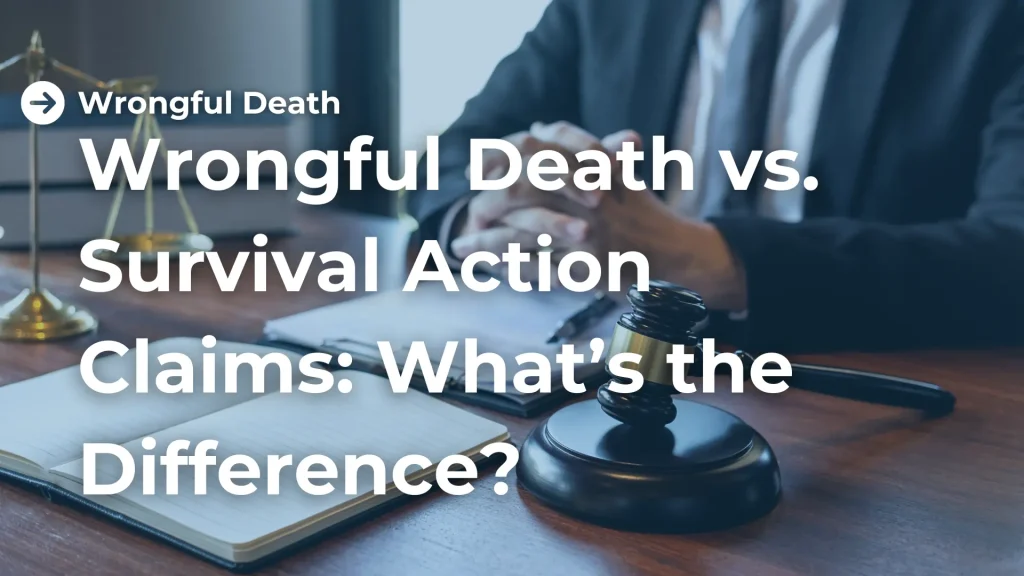
Losing a loved one in an accident can leave you immeasurably grief-stricken and unsure of how to proceed. Nothing can take away the pain of your loss, but you might be able to take legal action and get some modicum of financial relief. If one of your loved ones has died in an accident because of another’s negligence, you may be able to file a lawsuit and receive financial compensation. Wrongful death vs. survival action claims – which compensation do you deserve? In Texas, the two main paths for surviving parties to receive financial compensation are wrongful death and survival action claims.
What Is a Wrongful Death Claim?
In Texas civil law, a wrongful death lawsuit allows surviving family members or dependents to sue responsible parties for compensation after a fatal accident. The point of a wrongful death lawsuit is so that surviving family members can maintain financial security when a loved one passes away. Compensation for wrongful death claims includes money for things like medical bills, loss of financial support, pain & suffering, and loss of consortium/companionship.
What Is a Survival Action Claim?
A survival action claim is a separate type of claim that allows the deceased’s estate to recover financial compensation for their fatal accident. More specifically, survival action claims allow the deceased’s estate to recover similar compensation as the deceased would have if they had survived their accident — lost income, medical expenses, pain and suffering, etc.
The point of a survival action claim is to reimburse the deceased’s estate for expenses they incurred between the time of their injury and when they died. For example, suppose someone was in a car accident due to a distracted driver and survived for three months before dying from their injuries. In that case, a survival action claim can compensate their estate for incurred expenses during those three months. You can think of a survival action claim as a personal injury claim the deceased WOULD have made if they were still alive.
Usually, survival action claims require that the deceased experience a period of conscious pain and suffering between when the accident happened and death. Generally speaking, longer survival periods substantiate stronger survival action claims.
What Are the Main Difference Between Survival Action and Wrongful Death Claims?
Survival action and wrongful death claims are similar but legally distinct types of lawsuits. The crucial difference between the two is who can claim compensation. Wrongful death claims serve to compensate surviving family or dependents, while survival action claims are meant to compensate the deceased’s estate.
This distinction means that the money from wrongful death and survival action claims go to different places. In a wrongful death claim, courts award money to the deceased’s family members or dependents, depending on the specifics of the lawsuit. In a survival action claim, the money goes to the deceased’s estate, which then distributes it based on the deceased’s will.
Here is an example of how claim payouts would differ: Say a person loses their life due to an accident caused by a drunk driver. Surviving family members would be eligible to file a wrongful death lawsuit, and any compensation would go directly to them. In a survival action lawsuit, any recovered compensation would go to the deceased’s heirs as stated in their will.
In other words, wrongful death lawsuits are meant to redress the losses of surviving family members, while survival action lawsuits are about redressing losses from the deceased’s estate.
Who Can Initiate Wrongful Death and Survival Action Lawsuits?
According to the Texas Civil Practice and Remedies Code Section 71.004b, the only people who can initiate a wrongful death lawsuit are the deceased’s surviving:
- Spouse
- Children (including adopted)
- Parents (including adoptive)
Note that Texas law does not allow grandparents, siblings, or parents who gave their biological children away for adoption to file wrongful death lawsuits. Each eligible party can initiate a separate lawsuit, or they can all launch a single lawsuit. If none of these parties file a lawsuit within three months, the executor of the deceased’s estate can initiate a lawsuit unless all three parties request that they do not.
Eligibility rules for a survival action lawsuit are different. TX Civ. Prac. & Rem Code Sec 71.021 states that qualified parties that can initiate a survival action lawsuit are the deceased’s:
- Heirs
- Legal representatives
- Estate
The parties in these two types of claims might overlap, but who files which type of case ultimately depends on the specifics of the deceased’s will. If the deceased has no heirs or does not have a will, the court may appoint an estate representative who can make the appropriate type of claim.
Can You Make a Survival Action and Wrongful Death Claim?

Yes, it is possible to pursue a survival action and a wrongful death claim simultaneously if you are entitled to file for both. Since they are separate types of lawsuits, you need to file them separately. A personal injury attorney can fill out the necessary paperwork, gather evidence of loss, and calculate compensation for both types of claims.
It can be worthwhile to make both types of claims if you’re eligible because they have different benefits. Wrongful death claims primarily address any losses the family specifically has suffered, while survival action claims primarily address the deceased’s losses. The different focuses mean survival action claims are often a beneficial supplement to wrongful death claims.
What Is the Statute of Limitations for Wrongful Death and Survival Action Claims?
The statute of limitations for survival action claims in Texas is two years, the same as the statute of limitations for wrongful death claims (TX Civ. Prac. & Rem. Code Sec. 16. 003). However, for survival action claims, this limitation period can start up to one year after death or when the court appoints an executor of the deceased’s estate, whichever is sooner (TX Civ. Prac. & Rem. Code Sec 16.062).
Get Skilled Legal Representation for Your Wrongful Death Claim or Survival Action Today
Send Gibson Hill Personal Injury a message online or call today at 713-659-4000 for a free case consultation from our Houston wrongful death attorneys. Let our lawyers explain your options at this difficult, emotional time and help you with the legal process.




